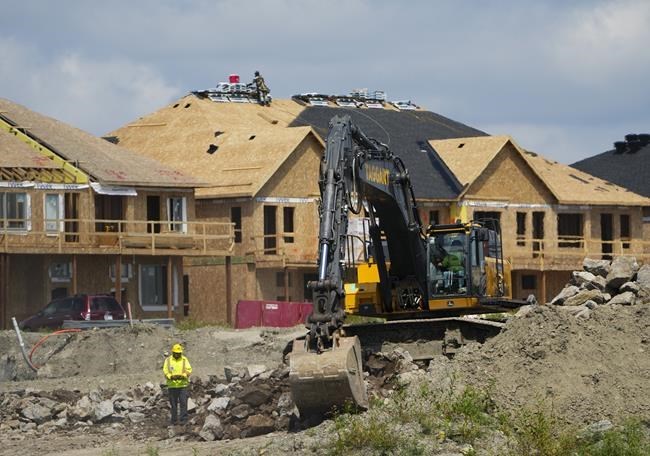OTTAWA — From local zoning to community consultations, there are plenty of ways cities are hitting the brakes on residential construction, even as Canada faces a significant housing shortage.
According to the Canadian Home Builders' Association, average municipal approval timelines for housing projects in 2022 spanned from three months to nearly three years, depending on the city.
That's why encouraging municipalities to build more homes, more quickly, is becoming a major focus of federal housing policy, as well as the politics around it.
The $4-billion Housing Accelerator Fund launched in June is a prime example of how the federal government plans to influence change at the municipal level.
Through the program, which runs through to 2026-27, municipalities territories and Indigenous governments can apply for extra funding to help boost housing supply. The Liberal government has said it would expedite the building of 100,000 new homes across the country.
"Although we may not have the technical responsibility to adjust municipal zoning bylaws, for example, we can create financial incentives for municipalities to do that," federal Housing Minister Sean Fraser said in an interview with The Canadian Press.
Leveraging federal dollars to encourage more housing to be built is also something Conservative Leader Pierre Poilievre has called for, although his approach, and his rhetoric, has been more adversarial.
Even before he became leader nearly a year ago, Poilievre seized on housing as a top policy issue.
He has blamed the Liberal government of Prime Minister Justin Trudeau for the housing affordability crisis. Poilievre has also lambasted municipal officials for stalling or blocking new housing developments, calling them "gatekeepers."
Housing experts, advocates and industry groups agree new developments are hindered by hefty municipal fees, exclusionary zoning bylaws and other roadblocks at the city level.
During his 2022 leadership campaign, Poilievre said he would require big cities such as Toronto and Â鶹´«Ă˝Ół»to boost housing construction by 15 per cent, or force them to face cuts to infrastructure grants, used by municipalities to fund such projects as transit systems, community services and outdoor spaces.
Tying federal dollars to housing results has become central to Poilievre's housing pitch as official Opposition leader too.
More recently, he said a Conservative government would only support transit projects that include high-density zoning around transit stations.
"The federal government funds transit. My common-sense plan is to use that funding as leverage. I'm going to say to the big-city mayors: If you want federal money for your transit station, you have to approve high-density apartments all around them," Poilievre said in a recent video posted online.
Kevin Lee, the CEO of the Canadian Home Builders' Association, said getting cities to allow for more urban intensification is key to addressing the housing crisis.
He said the Housing Accelerator Fund is a step in the right direction, but Lee is also supportive of tying infrastructure spending to housing results.
"There is quite a bit of federal dollars that go out the door in terms of supporting infrastructure, in terms of supporting transit. And so tying those dollars to housing outcomes that include more housing, of all types, that's important."
Whether offering more money or withholding funds, housing expert and economist Mike Moffatt said the Liberals and Conservatives are essentially proposing the same idea.
"I think a lot of the differences between the Liberals and Conservatives on that are more differences in tone than necessarily in approach," said Moffatt, an assistant professor at the Ivey Business School at Western University in London, Ont.
And while Moffatt said there are actions the federal government could take on housing beyond "bribing" other levels of government,Ottawa has the fiscal power to bring about change.
"The fact that the federal government is probably in the best financial position of any order of government allows them to make these kinds of deal(s)."
Fraser said the federal government is interested in using infrastructure spending to spur more housing development. But he said the government would do that by making more money available, rather than threatening to cut funding.
"When I looked at the Conservative leader's plan, it's not to incentivize it through giving infrastructure grants to people who build housing. It's to make cuts to people who don't meet a very particular standard," said Fraser.
But Conservative housing critic Scott Aitchison said taking a friendly approach with cities won't get more housing built.
"I don't understand why anybody would think it's unreasonable for the federal government to require some accountability for the dollars that they spend (on) municipalities," Aitchison said.
The Conservative MP, who previously had a career in municipal politics in Huntsville, Ont., knows first-hand how residents, often referred to as NIMBYs, for their "not-in-my-backyard" positions, try to push elected officials to stand against intensification.
"With municipalities, sitting around the campfire, singing Kumbaya has not worked," Aitchison said. "You've seen the federal government give money to cities, billions, and billions and billions over several years. And the results are where they are."
But whether it's by wielding a stick or dangling a carrot, a former provincial policymaker has hesitations about increased federal involvement in housing policy, even through infrastructure spending.
"Whenever you have more governments responsible for a policy area, the less accountability there is," said Benjamin Dachis, who served as Ontario Premier Doug Ford's director of policy, budget and fiscal planning between 2018 and 2019.
Dachis, who is now the associate vice-president of public affairs at the C.D. Howe Institute, a think tank, said offering cities more money could incentivize them to hold the federal government hostage by building housing only if given the money for it.
The "stick" approach may work better, Dachis said, but figuring out what the baseline is for getting funding would be difficult to do.
"It's very difficult from Ottawa to get this right on a city-by-city basis."
This report by The Canadian Press was first published Aug. 15, 2023.
Nojoud Al Mallees, The Canadian Press



